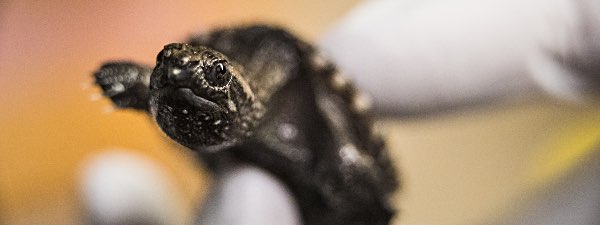- By Lindsey Hadlock
- Around Town
 Print
Print 
Between May and July of this year, the Janet L. Swanson Wildlife Hospital at the Cornell University College of Veterinary Medicine rescued approximately 150 eggs from more than a dozen pregnant turtles who had been hit by cars in New York, and were too injured to survive and lay eggs on their own.
"Turtle populations are experiencing declines worldwide, including here in New York state," said Sara Childs-Sanford, D.V.M., chief of service at the wildlife hospital. "Egg incubation at the hospital and release of the hatchlings assist turtle conservation efforts by supporting population numbers."
Depending on the temperature, the incubation period for these eggs is approximately 90 days. The hospital stored them in vermiculite with an ambient temperature of 70-75 degrees and watered the vermiculite several times a week to keep it moist. In the wild, both snapping and painted turtle eggs are typically buried by the mother in sandy areas.
Of the 150 eggs rescued, approximately 70 hatched at the hospital; the rest hatched in the care of certified wildlife rehabilitators.
Most of the turtles were released at the end of September, but some will be cared for through the winter by veterinary students and other volunteers.
"When kept over the winter, the advantage is that they grow quickly and will be much bigger by spring, thus having a better head start when finally released in June," said Alice VanDeMark, licensed veterinary technician and team leader.
The hospital advises that drivers keep a sharp eye out for turtles on the road, especially in the spring and summer. Allow a turtle to cross the road; if you help it do so, keep it moving in the direction it was headed.
v15i39



